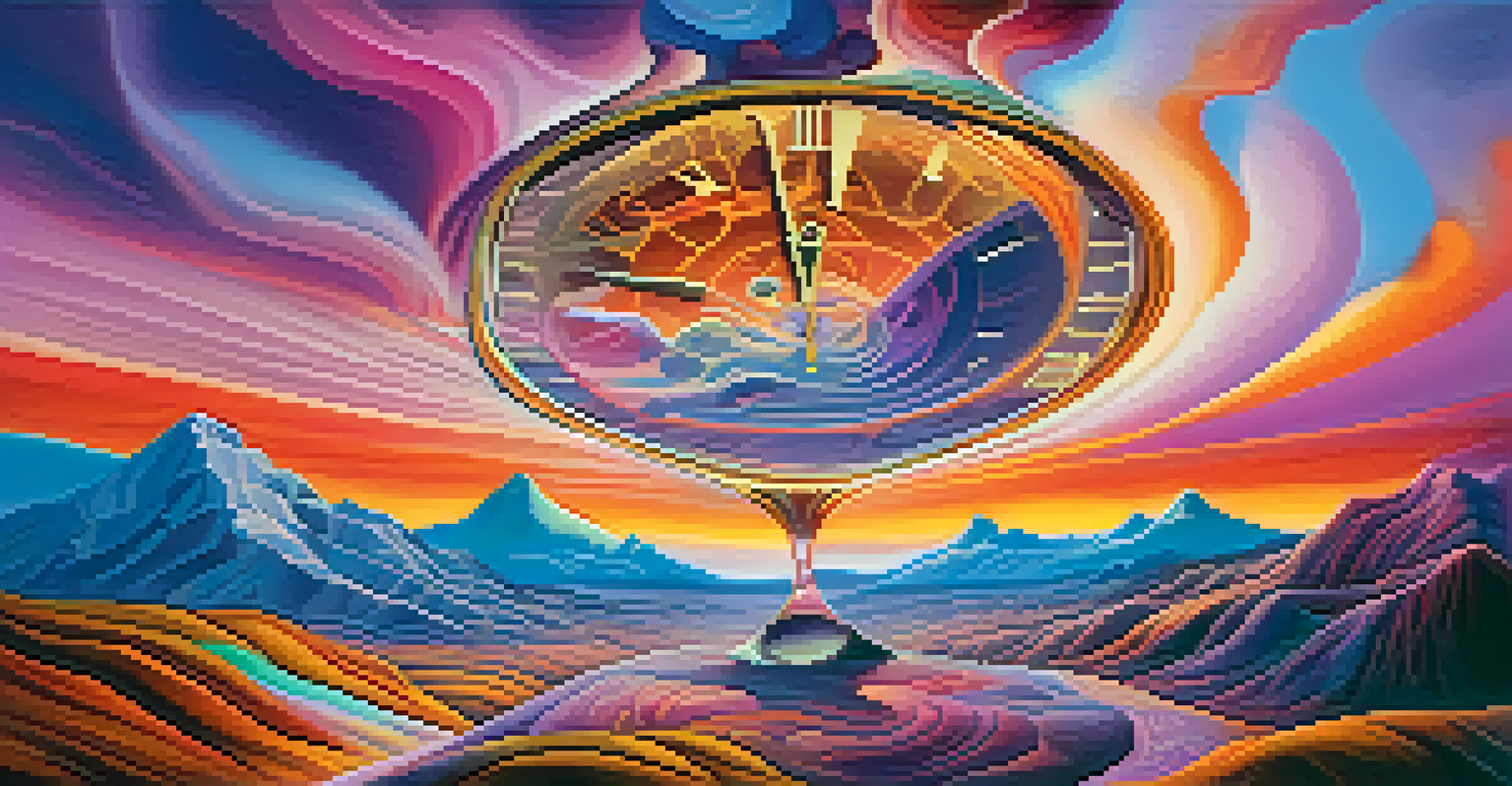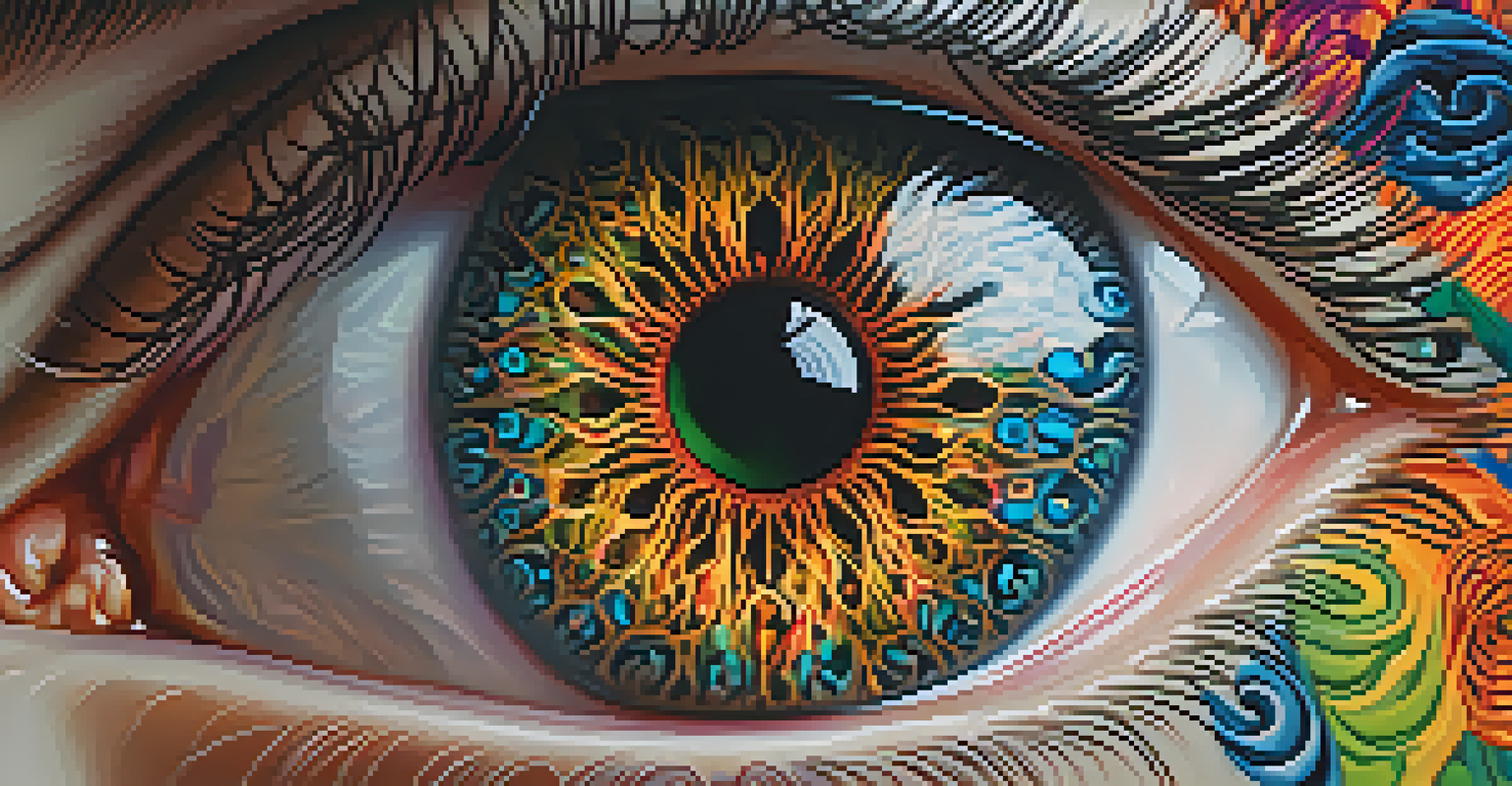Temporal Displacement: Hallucinogens and Time in Psychedelics

Understanding Temporal Displacement in Psychedelics
Temporal displacement refers to the altered perception of time that many users experience while under the influence of hallucinogens. This phenomenon can make minutes feel like hours, and vice versa, leading to a profound shift in how individuals perceive reality. Essentially, it’s as if the clock has lost its grip on the flow of moments, allowing users to explore time in a way that feels both surreal and enlightening.
Time is an illusion. Lunchtime doubly so.
When taking substances like LSD or psilocybin, users often report a feeling of timelessness, where past, present, and future blend into a single experience. This can lead to introspective insights, as individuals reflect on their lives or the universe without the usual constraints of time. Imagine standing still in a moment that stretches infinitely, giving you the freedom to explore your thoughts and feelings.
Understanding this concept is crucial for anyone looking to delve deeper into the psychedelic experience. It not only highlights the uniqueness of these substances but also opens the door to discussions about consciousness and the nature of time itself. As we continue to unravel these mysteries, we can better appreciate the complexities of the human mind.
The Science Behind Hallucinogens and Time Perception
Research into the effects of hallucinogens on time perception reveals a fascinating interplay between brain chemistry and subjective experience. Studies suggest that these substances can disrupt normal cognitive processing, leading to a distortion of time. For instance, psychedelics can affect the areas of the brain responsible for processing sensory information, which plays a role in how we perceive the passage of time.

One theory posits that hallucinogens increase the connectivity between different brain regions, facilitating a more holistic perception of experiences. This interconnectedness may enable users to process events and sensations simultaneously, making it difficult to pinpoint when one moment ends and another begins. Think of it like a symphony, where different instruments blend together to create a rich, immersive experience, rather than playing in isolated segments.
Psychedelics Alter Time Perception
Users often experience a profound shift in their perception of time, making moments feel stretched or compressed.
As we continue to study these effects, we gain insights into not just psychedelics, but also the fundamental nature of time itself. Understanding the brain's perception of time can have broader implications for fields such as psychology, neuroscience, and even philosophy. In this way, the exploration of temporal displacement is not just about drugs; it’s about unlocking the mysteries of human consciousness.
Personal Experiences: Anecdotes of Time Distortion
Many users of hallucinogens share captivating stories that illustrate the phenomenon of temporal displacement. For example, someone might describe an experience where they felt like they were reliving a single moment repeatedly, almost like a scene in a movie stuck on loop. This vivid recollection often leads to newfound insights about their life or relationships, highlighting how time perception can serve as a catalyst for personal growth.
The mind is everything. What you think you become.
Others recount moments where they felt a profound connection to the universe, experiencing time as a fluid, ever-changing entity. In these moments, the boundaries between self and other seem to dissolve, allowing for a deep sense of unity with everything around them. Picture a river that flows continuously, where every drop of water represents a moment in time, merging and diverging in an endless dance.
These personal anecdotes not only showcase the power of psychedelics in altering time perception but also underscore the subjective nature of these experiences. Each story is unique, shaped by individual backgrounds and perspectives, which adds to the rich tapestry of knowledge we have about the effects of hallucinogens. As we hear these stories, we begin to appreciate the vast potential for transformation that lies within each psychedelic journey.
Cultural Perspectives on Time and Psychedelics
Throughout history, various cultures have recognized the unique relationship between time and altered states of consciousness. Indigenous tribes often use hallucinogens in spiritual rituals, viewing these experiences as opportunities to transcend time and connect with ancestral wisdom. This cultural context adds depth to our understanding of how psychedelics can facilitate profound temporal experiences.
In many traditions, the concept of time is not linear but cyclical, allowing for a different interpretation of past and future. When combined with hallucinogens, this perspective can enhance the feeling of being part of a larger cosmic cycle. Imagine stepping into a circle rather than a straight line, where every point represents a significant moment in your life, all accessible at once.
Therapeutic Potential of Time Distortion
Altered time perception in psychedelics can facilitate healing by allowing individuals to process past trauma from a new perspective.
By examining these cultural perspectives, we can better appreciate the role of psychedelics in shaping our understanding of time. They not only offer personal insights but also serve as a bridge to collective consciousness and shared human experiences. This rich interplay between culture, spirituality, and psychedelics invites us to rethink our own perceptions of time and reality.
Potential Therapeutic Benefits of Time Distortion in Psychedelics
Recent studies have begun to explore the therapeutic potential of psychedelics, particularly in relation to their effects on time perception. For individuals grappling with trauma or anxiety, the ability to step back from a rigid timeline can facilitate healing. This altered perception allows individuals to view their experiences from a new angle, often leading to transformative insights and emotional release.
Therapists are increasingly recognizing the value of incorporating psychedelic experiences into treatment plans. By guiding clients through these journeys, they can help them process past traumas without the constraints of time. Imagine being able to revisit painful memories as if they were distant echoes rather than immediate realities, creating space for healing and understanding.
As research expands, we may uncover even more applications for psychedelics in mental health care. Understanding how altered time perception can aid in therapeutic settings could revolutionize the way we approach psychological treatment. This intersection of time, healing, and psychedelics holds immense promise for those seeking relief from emotional pain.
The Risks and Ethical Considerations of Psychedelic Use
While the exploration of psychedelics offers exciting possibilities, it's essential to acknowledge the potential risks and ethical considerations involved. Not everyone will have a positive experience, and for some, the alteration of time perception can lead to confusion or anxiety. It's crucial for individuals to approach these substances with caution and an understanding of their mental health background.
Moreover, as the popularity of psychedelics grows, so does the need for responsible usage and regulation. Ethical considerations must guide research and therapeutic practices, ensuring that individuals are protected and informed. Picture a map that outlines safe paths for exploration, helping users navigate the often unpredictable terrain of their minds.
Cultural Views on Time and Psychedelics
Various cultures have recognized the relationship between time and altered states, seeing psychedelics as a means to transcend linear time.
Ultimately, creating a balanced discourse around the benefits and risks of psychedelics is essential for fostering a safe environment for exploration. By encouraging open discussions and sharing knowledge, we can help individuals make informed choices about their journeys with these powerful substances. This balanced approach will not only promote safety but also encourage meaningful conversations about the nature of reality and time.
Looking Ahead: The Future of Psychedelic Research
The future of psychedelic research holds great promise, particularly regarding our understanding of time perception and consciousness. As more studies emerge, we can expect to uncover deeper insights into how these substances affect the brain and our experience of reality. This ongoing exploration could reshape our understanding of mental health, spirituality, and the human experience.
Innovations in research methodologies and technology will likely play a significant role in advancing our knowledge of psychedelics. For instance, neuroimaging techniques can help visualize how the brain processes time during psychedelic experiences. Imagine watching a vibrant light show that reveals the intricate dance of neurons as they communicate in ways we’ve never seen before.

As we move forward, it’s crucial to foster collaboration among scientists, therapists, and cultural historians. By embracing a multidisciplinary approach, we can create a more comprehensive understanding of the ways psychedelics impact our perception of time. This collective effort will not only enhance our knowledge but also deepen our appreciation for the mysteries of consciousness and the universe.